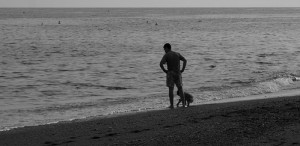After outliving a father, a son considers two different lives
I remember the day I turned 59. I had survived 58, the age at which Tony Heynen, my father, died. In the years leading up to 58 I’d wondered if his age at death would also be mine. Fifty-nine came with a sigh of relief.
Had he enjoyed today’s science, and a more sober physician, he could have been cured of the cancer that took him. But he accepted his diagnosis with Calvinistic fatalism and silently suffered indescribable headaches as the cancer grew lesions around his brain, squeezing it into increasing agony over his final two years.
I was his default caregiver. My mother worked to keep us afloat. I didn’t mind skipping school to measure prescriptions, prepare his meals and keep his company. We made it work until the night he armed himself with a butcher knife and thought she was attacking him. The next morning we accepted the hospital’s offer of a room.
I began grieving the loss of him earlier than the September day he died. My grief began the morning I leaned across his bed to turn his wasting body without hurting him. He gave me a wan smile of recognition and said softly, “Thanks, Dad….” He had it right. I had become my father’s father, and I knew something had died. It was shortly after dawn, my 18th birthday.
Tony Heynen’s obituary was brief and honest. It acknowledged his years as a teacher and a corporate accountant. It named his family.
But the tribute I liked best was rendered by Forest Wilson, a man as nearly unlike my father as could be imagined. Forest was a big man who’d driven nitroglycerin-laden trucks over mountain passes and ended barroom fights with an impressive right hand. My father was a half-foot shorter than Forest, mild, and given to reading The New Yorker. On the afternoon we buried my father, Forest Wilson put on a suit and tie, locked up his Mobil station, and explained his absence on a 3x5 card taped the front door with greasy fingerprints: “Closed to go to a good man’s funeral.”
In his brilliant “Far from the Tree,” Andrew Solomon reminds us that “Insofar as our children resemble us, they are our most precious admirers, and insofar as they differ, they can be our most vehement detractors. From the beginning, we tempt them into imitation of us and long for what may be life’s most profound compliment: their choosing to live according to our own system of values. Though many of us take pride in how different we are from our parents, we are endlessly sad at how different our children are from us.”
I remembered Solomon last Saturday after a joyful family gathering with children and grandchildren. Two generations of births and adoptions have created a United Nations of a family. My father detested racism. I remember him explaining anti-Semitism to me in such a way that I, too, instantly abhorred it. His system of values, at least in part, helps explain our family’s diversity: We are African, European, Chinese, Korean and probably several unknown others.
I’ve not stayed in my father’s chosen town, or a profession he’d recognize, or the church to which he was infinitely loyal. But in ways I’ve only recently recognized, I’ve lived mostly by his system of values. I have no patience for inflated egos or self-righteous bigots. I don’t trust debt. Noisy politicians and arrogant preachers get neither my vote nor my money. I start my day reading The New York Times. A granddaughter excuses my quietness, and sometimes my absence, as shyness. I’d prefer a grease-stained card from an honest working man to a decorated obituary written in fancy prose.
I’ve had experiences he never had in a world he could not have imagined. He never left the country, never saw a grandchild, never took money he’d not earned. I’ve worked in corporate boardrooms and Haitian slums, known presidents and prisoners, held dying infants in an African village and cradled my grandson at his birth. I’m paid more for an hour of advice than he earned for a week of hard work and, when I hold my paycheck, I hear his voice echoing down a half-century, “Who do you think you are!?”
My years say that I’ve outlived my father. In ways, some important, it’s not true. He lived a life that was full, honorable, perhaps too brief but still complete. My years are more than his, but I will never outlive the quiet grace with which he served and then died.
I’ve come to believe that I did not land far from the tree.
See what new members are saying about why they donated to Bridge Michigan:
- “In order for this information to be accurate and unbiased it must be underwritten by its readers, not by special interests.” - Larry S.
- “Not many other media sources report on the topics Bridge does.” - Susan B.
- “Your journalism is outstanding and rare these days.” - Mark S.
If you want to ensure the future of nonpartisan, nonprofit Michigan journalism, please become a member today. You, too, will be asked why you donated and maybe we'll feature your quote next time!


 THE OLD MAN: Fathers and sons share a blood bond, but may lead radically different lives. (Photo by Flickr user Landahlauts; used under Creative Commons license.)
THE OLD MAN: Fathers and sons share a blood bond, but may lead radically different lives. (Photo by Flickr user Landahlauts; used under Creative Commons license.)